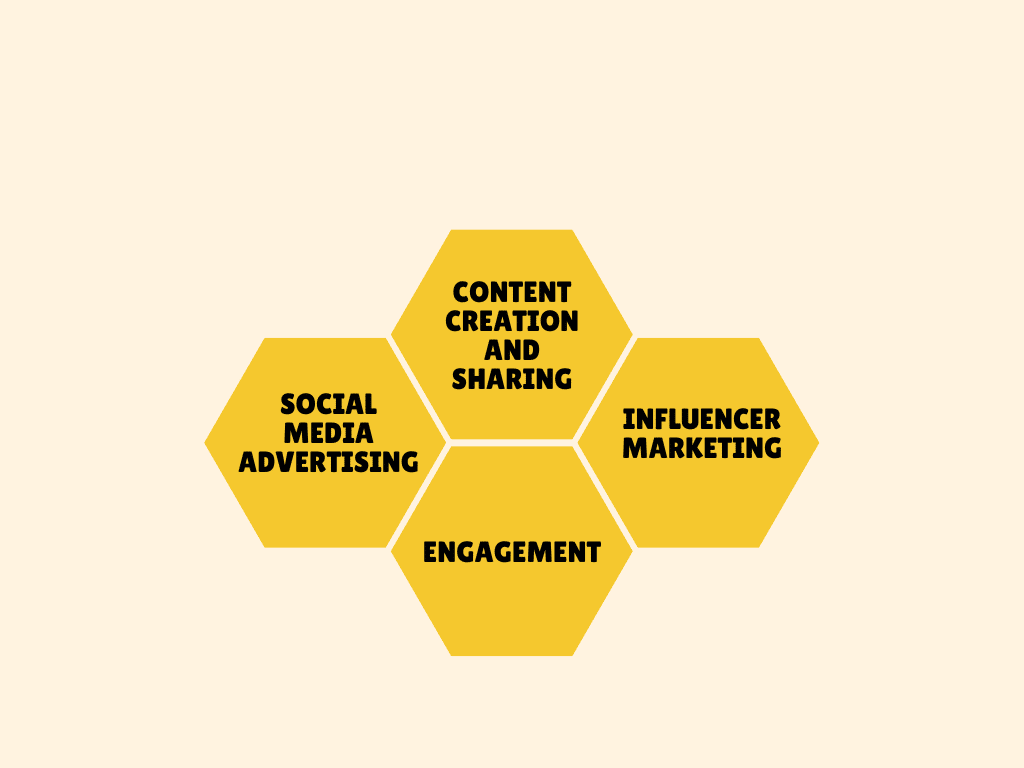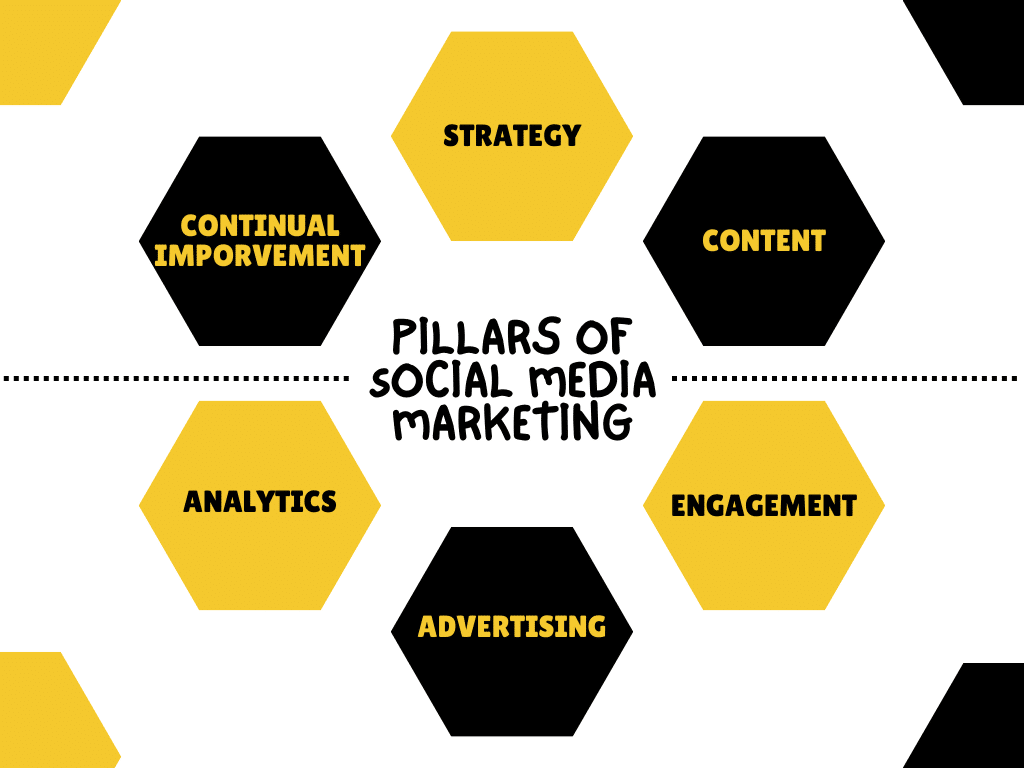- Benefits of Social Media Marketing
- Why is Social Media Marketing So Powerful?
- How Social Media Marketing Works?
- Advantages and Disadvantages of Social Media Marketing
- Essentials of a successful social media marketing strategy
- Examples of Social Media Marketing Strategies
- Pillars of Social Media Marketing
- Conclusion
- FAQs
Social media marketing is the process of promoting a product or service through various social media platforms such as Facebook, Instagram, Twitter, LinkedIn, and many others. Social media marketing aims to reach a larger audience, increase brand awareness, and drive sales. This can be achieved through various tactics, such as creating engaging content, running targeted ads, and collaborating with influencers.
One of the key benefits of social media marketing is its ability to reach a large and diverse audience. With over 4 billion active social media users worldwide, there is a significant opportunity to connect with potential customers, regardless of location or demographic. Social media platforms also offer advanced targeting options, allowing businesses to reach specific groups of people based on factors such as age, location, interests, and behaviors with WhatsApp Marketing is another tool available to accomplish same objectives.
Another benefit of social media marketing is the ability to create engaging content that resonates with potential customers. Social media platforms are designed to be highly interactive and encourage user engagement. This allows businesses to connect with customers more personally, building trust and loyalty over time. By creating compelling content that aligns with the interests of the target audience, businesses can increase the chances of engagement and drive conversions.
Social media marketing also provides an opportunity to collaborate with influencers who have a strong following on social media platforms. By partnering with influencers, businesses can leverage their credibility and reach to promote their products or services to a highly engaged audience. Influencer marketing can also help businesses to build credibility, improve brand awareness, and increase conversions.
Finally, social media marketing provides valuable insights into customer behavior and preferences. Businesses can gather valuable data on customer demographics, preferences, and purchasing habits by monitoring social media metrics such as engagement, reach, and conversions. This information can then be used to improve marketing strategies, target ads, and tailor products or services to meet customer needs.
Benefits of Social Media Marketing
- Increased brand awareness: Social media platforms have a large user base, which makes it easier for businesses to reach a wider audience. This increased visibility helps create brand awareness, making customers more likely to choose your business over a competitor.
- Cost-effective: Social media marketing is relatively inexpensive compared to traditional marketing methods. Platforms such as Facebook, Instagram, and Twitter offer free business accounts, and paid advertising options are also available at a fraction of the cost of traditional advertising.
- Targeted audience: Social media platforms allow businesses to target specific demographics, such as age, location, and interests. This helps businesses to reach their desired audience more effectively, increasing the chances of conversions.
- Increased website traffic: Social media platforms can also drive traffic to a business's website, increasing the chances of conversions and sales. By sharing content on social media, businesses can attract potential customers to their websites where they can learn more about the business and its products or services.
- Greater customer engagement: Social media platforms provide businesses with a direct line of communication with their customers, allowing them to respond to questions and concerns in real time. This level of engagement can help to build trust and loyalty among customers.
- Increased conversion rate: By providing valuable information and engaging with customers, businesses can increase the likelihood of conversions. Social media platforms allow businesses to build relationships with their audience, which can ultimately lead to increased sales and revenue.
- Increased customer retention: Businesses can improve customer retention by staying active on social media by keeping their brand top-of-mind with their audience. This can help businesses retain customers for longer periods, reducing the need for continuous customer acquisition.
- Increased brand loyalty: By consistently providing valuable information and engaging with customers, businesses can build brand loyalty among their audience. Social media platforms allow businesses to connect with their audience personally, which can ultimately lead to increased brand loyalty and customer retention.
- Gather customer insights: Social media platforms allow businesses to track and analyze their audience engagement, demographics, and interests. This information can be used to create better marketing strategies and improve products or services based on customer feedback.
- Increased reach: By using social media, businesses can increase their reach beyond their current customer base. Social media platforms allow businesses to expand their reach by targeting new and potential customers, increasing the chances of conversions and sales.
Why is Social Media Marketing So Powerful?
Social media marketing is powerful for several reasons:
- Reach: Social media platforms have a large user base, making it easy for businesses to reach a wide audience. This increased visibility helps to create brand awareness and increase conversions.
- Targeting: Social media platforms allow businesses to target specific demographics, such as age, location, and interests. This helps businesses to reach their desired audience more effectively.
- Engagement: Social media platforms provide businesses with a direct line of communication with their customers, allowing them to respond to questions and concerns in real time. This level of engagement helps to build trust and loyalty among customers.
- Data: Social media platforms allow businesses to track and analyze their audience's engagement, demographics, and interests. This information can be used to create better marketing strategies and improve products or services based on customer feedback.
- Cost-effective: Social media marketing is relatively inexpensive compared to traditional marketing methods, making it accessible to businesses of all sizes.
- Authenticity: Consumers are more inclined to trust brands they feel they know; by creating a strong personal brand with the help of social media, companies can build a powerful bond with their customers, which makes them more likely to return.
- Authentic Influencers: Social media influencers are people who are followed and admired by many social media users; by leveraging their influence, businesses can reach an audience that would be difficult to target through traditional advertising methods.
- Social proof: social media platforms allow businesses to showcase customer reviews and testimonials; this can be powerful in influencing potential customers, as it helps to build trust and credibility.
Overall, social media marketing is powerful because it allows businesses to reach a large audience, target specific demographics, build relationships with customers, and gather valuable data, all cost-effectively.
How Social Media Marketing Works?
Social media marketing refers to the process of using social media platforms to promote a product, service, or brand. This can be done in various ways, including creating and sharing content, running social media ads, and engaging with followers.

- Content creation and sharing: This involves creating content that is relevant to the product or service being promoted and sharing it on social media. This can include text posts, images, videos, and infographics.
- Social media advertising - It involves paying to promote a post or create an advertisement on a social media platform. These ads can target specific demographics, such as age and location.
- Engagement- This involves interacting with followers and other social media users to build relationships and gain more visibility for the product or service being promoted. This can include responding to comments, messages, and direct messages.
- Influencer marketing - It is partnering with individuals who have a significant following on social media to promote your product or service to a larger audience through their social media accounts.
Overall, social media marketing aims to increase brand awareness, drive traffic to a website, and ultimately increase sales.
Advantages and Disadvantages of Social Media Marketing
| Advantages of Social Media Marketing | Disadvantages of Social Media Marketing |
| Low cost: Many social media platforms are free to use, and even paid advertising on these platforms is relatively inexpensive. Targeted advertising: Platforms like Facebook and LinkedIn allow you to target specific groups of people based on demographics, interests, and behaviors. Increased brand awareness: Social media platforms have a vast user base, which can help increase awareness of your brand and products. Improved customer engagement: Social media allows companies to interact with their customers and receive immediate feedback directly. Higher conversion rates: Social media traffic is often more engaged and likely to convert into paying customers than traffic from other sources. | Time-consuming: Managing a social media presence can be time-consuming and may require additional staff. Constant changes: Social media platforms and algorithms are constantly changing, which can make it difficult for businesses to keep up. Lack of control over the platform: Social media platforms can change how they operate at any time, which can negatively affect a business's social media strategy. Potential negative impact: Negative comments or reviews on social media can be publicly viewed by potential customers and may negatively impact a business's reputation. Risk of spreading misinformation: Social media is also a breeding ground for misinformation, which can be hard to control and can negatively impact businesses. |
Essentials of a successful social media marketing strategy
A successful social media marketing strategy typically includes the following elements:
- Clear goals and objectives: Establish specific, measurable, and achievable goals for your social media marketing campaign. These goals can include increasing brand awareness, driving website traffic, or generating leads.
- Target audience: Identify and understand your target audience, including their demographics, interests, and behaviors. This information can be used to create effective social media content and advertisements that will resonate with your target audience.
- Platforms: Choose the appropriate social media platforms for your business. Consider which platforms your target audience is most active on and where your competitors are present.
- Content: Create high-quality, engaging content that aligns with your goals and objectives and resonates with your target audience. This can include text, images, videos, infographics, and more.
- Scheduling and Consistency: Develop a content calendar and posting schedule to ensure that your social media accounts are active and updated regularly.
- Advertising: Utilize social media advertising to reach a wider audience and drive more engagement.
- Measurement and analysis: Use analytics tools to measure the performance of your social media campaigns and identify what is working and what is not. Continuously monitor and adjust your strategy accordingly.
- Community management: Actively engage with your audience and respond to comments, questions, and concerns promptly and professionally.
- Flexibility and Adaptability: Be ready to adapt your strategy to the changes of the platform's algorithm and the market trends.
Some of the most popular social media marketing platforms for businesses include:
- Facebook - With over 2.8 billion monthly active users, Facebook is one of the world's most widely used social media platforms. It offers a variety of tools for businesses to create and manage their own pages, as well as run ads and track analytics.
- Instagram - Owned by Facebook, Instagram is a highly visual platform that is popular among younger users and is especially well-suited for businesses in the fashion, beauty, and lifestyle industries.
- Twitter - Twitter is a microblogging platform that allows businesses to communicate with their followers in short, real-time messages. It can be a powerful tool for customer service, crisis management, and real-time event marketing.
- LinkedIn - LinkedIn is a professional networking platform that allows businesses to create a company page and connect with other professionals in their industry. It can be a valuable tool for B2B marketing, recruitment, and thought leadership.
- YouTube - YouTube is the world's largest video-sharing platform. It allows businesses to create their own channels and upload videos to promote their products and services.
- TikTok - TikTok is a mobile video-sharing social networking service which becomes rapidly popular in recent years; it can be useful for businesses looking to target a younger audience and create interactive content.
Remember that the best social media platform for your business will depend on your specific industry and target audience, as well as your goals and resources.
Examples of Social Media Marketing Strategies
Here are a few examples of social media marketing strategies that businesses can use:
- Content Marketing: Creating and sharing valuable, informative, and entertaining content to attract and engage a specific target audience. This can include blog posts, videos, infographics, and more.
- Influencer Marketing: Partnering with individuals who have a large and engaged following on social media to promote your brand or products. This can include paying influencers to create sponsored content or running a social media contest in partnership with an influencer.
- Paid Advertising: Running paid ads on social media platforms such as Facebook, Instagram, and LinkedIn to reach a wider audience and drive more traffic to your website.
- Engagement: Focusing on building relationships with your followers by responding to comments and messages, hosting Q&A sessions, and running social media contests and giveaways.
- Video Marketing: Creating and sharing videos on social media platforms like YouTube and TikTok to promote products and services, increase brand awareness and drive website traffic
- User-generated content: Encourages customers and followers to share their photos, videos, and reviews of your products and services and repost them to your social media account.
- Live Streaming: Use platforms such as Facebook Live, Instagram Live, or TikTok Live to interact with your audience in real time and create a sense of immediacy and exclusivity.
It's important to keep in mind that having a well-rounded strategy by combining different approaches can help to reach a broader audience and also keep your social media presence fresh and engaging.
Pillars of Social Media Marketing
The pillars of social media marketing are the foundational elements that a business needs to have in place to succeed in its social media efforts.

- Strategy: Develop a plan outlining your business goals and objectives, target audience, and tactics you will use to achieve them.
- Content: Creating high-quality, relevant, and engaging content that aligns with your strategy, resonates with your target audience, and encourages engagement.
- Engagement: Building relationships with your followers by responding to comments and messages, hosting Q&A sessions, and running social media contests and giveaways.
- Advertising: Running paid ads on social media platforms, such as Facebook, Instagram, and LinkedIn, to reach a wider audience and drive more traffic to your website.
- Analytics: Tracking the performance of your social media efforts using tools such as Google Analytics, Facebook Insights, and Twitter Analytics to make data-driven decisions and optimize your strategy.
- Continual improvement: Continually evaluate and optimize your social media strategy to better reach your goals and adapt to changing social media platforms, algorithms, and trends.
By focusing on these pillars, businesses can create a strong foundation for their social media marketing efforts and increase their chances of success.
Conclusion
Social media marketing (SMM) can be a powerful tool for businesses of all sizes to reach new audiences, engage with customers, and build brand awareness. When done correctly, SMM can help to drive website traffic, generate leads, and increase sales.
However, it's important to have a clear strategy in place and a deep understanding of the target audience. By having a strategy, creating engaging content, building relationships through engagement, running effective advertising campaigns,s and tracking performance with analytics, businesses can increase their chances of success in social media marketing.
One key takeaway is that social media marketing is an ongoing process, and it's important for businesses to be adaptable and to keep up with changing platforms, algorithms, and trends.
In summary, social media marketing is an essential part of modern digital marketing and has the potential to help businesses achieve a variety of goals. By focusing on the pillars of strategy, content, engagement, advertising, analytics, and continual improvement, businesses can increase their chances of success in social media marketing.
FAQs
The process of promoting a product, service, or brand on social media platforms is known as social media marketing. This can include creating and sharing content, running social media ads, and engaging with followers to build relationships and increase brand awareness. The goal of social media marketing is typically to drive website traffic, increase sales, or improve customer engagement. Social media platforms that are commonly used for marketing include Facebook, Instagram, Twitter, and LinkedIn.
The main point of social media marketing is to increase brand awareness and engagement and ultimately drive sales by reaching a larger audience and building relationships with potential and existing customers. Businesses can build trust and establish themselves as industry experts by creating and sharing valuable content and engaging with followers. Additionally, businesses can use social media advertising to target specific demographics, interest groups, and geographic areas to reach a more relevant audience and increase the chances of conversion. With a well-defined strategy and the use of analytics, it can help measure the effectiveness of a campaign and make necessary adjustments to improve performance.
a) Connect with the Target Audience
b) Follow a hyper-personalized social media strategy
c) Multiple Social Media Platforms for effective outcomes
d) Create Attractive Content on social media
e) Optimize Social Media Profiles
a) Content
b) Networking
c) Reviews
d) Advertising
e) Research






